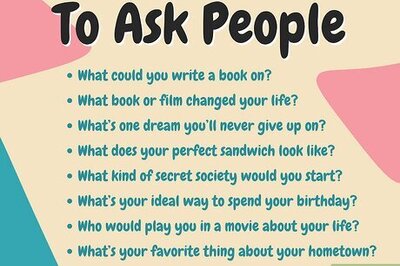
views
London:Satire
In the more traditional realm of news-based fun, Yahoo's French website led its front page with the announcement that, to save money, President Francois Hollande would move his offices from the Elysee Palace to one of Paris's grittier suburbs.
"Nesta Vowles" had a story in Britain's Daily Mail about owls being trained, Hogwarts-style, to deliver internal mail in an office. It carried photographs of what it called the "Roy-owl Mail". The rival Daily Express said Queen Elizabeth was renting out rooms at Buckingham Palace - but, perhaps fearing for its switchboard, hastened to tell readers that this was a joke.
The Sun mocked up a shot of Mick Jagger in a tent and said the millionaire Rolling Stones were getting into practice for playing at the Glastonbury rock festival by spending Easter out of doors - at the Rolf Apilo campsite, of course.
In a more sharply satirical vein, the Independent took aim at plans to control the British press by reporting that a pro-regulation lobby group, backed by celebrity victims of media intrusion, was being consulted by foreign governments including Burma and Sudan on how to deal with troublesome journalists.
The Times reflected back to a gentler age with a story of newly discovered diaries by a 19th-century army officer that quoted "experts" comparing them to two famous historical hoaxes - Piltdown Man's fake "pre-human" bones and the Hitler Diaries.
Such heavy-handedness seemed an admission of defeat for a genre whose heyday in more innocent times saw the BBC bombarded with calls for seed catalogues after it broadcast a news item on "spaghetti trees" in 1957; 20 years later, would-be tourists called the Guardian for information on how to get to the idyllic - but sadly entirely typographical - island of San Seriffe.
It took French post office, La Poste, to highlight the struggle for survival faced by traditional media in a new technological age; it issued a press release announcing that airborne drones were delivering newspapers to people's homes.
Blurring the lines between mirth and marketing, Britain's Daily Mirror carried a story on the launch of glass-bottomed airliners - offering special sightseeing trips over Loch Ness. It would, it said, be operated by Richard Branson's Virgin airline - which duly carried its own online advert for the new planes, along with publicity for its real new domestic service.
With April Fools Day ever more an ad man's dream rather than a moment for pranks in the playground, Coca-Cola put an ironic, postmodern twist on the whole bluff-or-double-bluff atmosphere by advertising a relaunched vanilla version of the fizzy drink in Britain: The slogan? "It's back! - (no really, it is)".
If the stress of sifting fact from fiction seemed too much, particularly for fellow journalists writing reports from the frontline of foolery, once could have left it to Britain's Metro newspaper to do the legwork and make things easier.
Its 2013 "round-up of the best jokes" from other media included a BBC story on NASA's Mars rover tweeting that bullying by Internet trolls was forcing it off Twitter, the Telegraph on rabbits bred with human ears and a supermarket press release offering to deliver food via a 3D printer.
Trouble is, those were all made up by Metro. April Fools!
####[View the story ”The best April Fool’s jokes and hoaxes of 2013” on Storify]


















Comments
0 comment